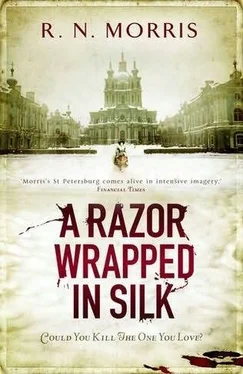R. Morris - A Razor Wrapped in Silk
Здесь есть возможность читать онлайн «R. Morris - A Razor Wrapped in Silk» весь текст электронной книги совершенно бесплатно (целиком полную версию без сокращений). В некоторых случаях можно слушать аудио, скачать через торрент в формате fb2 и присутствует краткое содержание. Жанр: Исторический детектив, на английском языке. Описание произведения, (предисловие) а так же отзывы посетителей доступны на портале библиотеки ЛибКат.
- Название:A Razor Wrapped in Silk
- Автор:
- Жанр:
- Год:неизвестен
- ISBN:нет данных
- Рейтинг книги:5 / 5. Голосов: 1
-
Избранное:Добавить в избранное
- Отзывы:
-
Ваша оценка:
- 100
- 1
- 2
- 3
- 4
- 5
A Razor Wrapped in Silk: краткое содержание, описание и аннотация
Предлагаем к чтению аннотацию, описание, краткое содержание или предисловие (зависит от того, что написал сам автор книги «A Razor Wrapped in Silk»). Если вы не нашли необходимую информацию о книге — напишите в комментариях, мы постараемся отыскать её.
A Razor Wrapped in Silk — читать онлайн бесплатно полную книгу (весь текст) целиком
Ниже представлен текст книги, разбитый по страницам. Система сохранения места последней прочитанной страницы, позволяет с удобством читать онлайн бесплатно книгу «A Razor Wrapped in Silk», без необходимости каждый раз заново искать на чём Вы остановились. Поставьте закладку, и сможете в любой момент перейти на страницу, на которой закончили чтение.
Интервал:
Закладка:
Granny Kvasova’s face contracted in distaste. However, she seemed to take in Virginsky’s threat. She calmed down enough for her voice to drop several tones to a more comfortable register. ‘A friend of hers, are you?’
Virginsky noted the malice in her cold eyes. ‘I am here as a magistrate, on official business.’ He looked about him dismissively. ‘This place … what kind of a home life do you provide the children here?’
‘It’s a roof over their heads, warm grub in their bellies. A bed to sleep in.’
‘Where do they sleep?’
‘You want to see their beds, do you?’ There was something unspeakably disgusting about the intonation with which she managed to invest the question.
Virginsky looked away from the woman, suppressing an impulse to strike her. The children were beginning to rise from their hurried meal. ‘I repeat, I am a magistrate. I am investigating the disappearance of a child who was in your care. The more I can learn about his life before he went missing, the better our chances of finding him.’
‘I don’t see how looking at his bed will help.’
‘I have not come here to discuss my methods with you, old woman. Show me where he slept, before I haul you in and charge you with obstructing a magistrate in the execution of his duties.’
‘There’s nothing much to see, I tell you,’ said Granny Kvasova, undaunted.
‘Nevertheless,’ insisted Virginsky.
The children were now filing out to return to work, each one enclosed in his or her own morose silence. They were not like children, but like shrunken adults, already worn down and defeated by the treadmill of their existence. What was most shocking to Virginsky was the blankness of their expressions. He saw no trace of the outrage or horror that they should by rights have displayed at the prospect of the afternoon ahead of them. In one or two, perhaps, there was a look of puzzled awe, as if they were struggling to comprehend the mystery of their lives. But that may simply have been the expression their faces naturally fell into when they were exhausted.
‘You will show me the sleeping quarters. Now.’
Granny Kvasova clicked her tongue and took her time. She led Virginsky through a door in the side wall of the canteen, directly into a dormitory. The beds, such as they were, consisted of a series of long wooden platforms, subdivided by partitions. Each of the sleeping booths created by this arrangement was numbered, and furnished with a coarse grey blanket. As there was no space separating each ‘bed’ from its neighbour, the children had nowhere to put any personal belongings. Indeed, it seemed doubtful that they possessed any. Worse still, there was no space for them to simply be. No chairs to sit in. No floor to play on. The room was severely purposed. You came into it, found your booth, and fell into it to sleep the sleep of the physically exhausted.
It was cold but airless. The accumulated smells of humanity, or their ghosts, stirred resentfully at this unwonted daytime intrusion.
‘Which was Mitka’s bed?’
‘What difference does it make? Someone else has it now.’
‘He has been replaced?’
‘Of course.’
‘Even so, show me where he slept.’
Granny Kvasova approached one of the booths and bowed grimly at it. Virginsky rubbed his chin as he contemplated the empty space. In truth, he did not know what he was looking for. He wondered what Porfiry Petrovich would do, without reaching any definite conclusion. He realised he had only insisted on seeing the bed because he had been goaded by the old woman’s obstructiveness.
He tried to imagine Mitka curled up on the bed. Of course, he had no idea what Mitka looked like. Instead, an image of Pasha, the boy he had spoken to that morning, flashed momentarily before him.
‘Are all the children who live here orphans?’
‘Yes, we get them from the Foundling Hospital.’
The woman spoke of them as if they were a commodity, just another raw material to be processed in the factory.
‘What kind of a life is this for children?’
‘It’s not so bad. It keeps them out of trouble. How would they live if they were not here? Ask yourself that. By thieving and whoring, you can be sure.’
‘Not if they were educated.’
‘Educated! A lot of good it did Mitka!’
‘Why do you say that? Do you know what became of him? And no more of your scandalous lies, madam.’
‘Dead in a ditch, I shouldn’t wonder. That boy doesn’t have the sense to keep himself from falling in the canal. He wouldn’t survive a day outside here.’
‘Perhaps not. Perhaps he preferred one day of freedom to a lifetime of this.’
‘If that’s what her school taught him then it did him no favours.’
Virginsky continued to stare at the tiny space allocated to Mitka to sleep in. Even the boy’s dreams, it seemed, had been confined and restricted.
‘Have you seen enough?’ squealed Granny Kvasova. ‘Do you know where to find him now?’ she added sarcastically.
Virginsky shook his head. ‘At least I know what he ran from.’
17 The beggar’s song
The following day a sluggish grey fog hung deliberately in the air, as if generated by the city to impede his investigation. Virginsky kept his head bowed as he burrowed into it. The moisture took possession of the urban spaces, forcing the human inhabitants off the streets. It brought with it a sense of spreading hopelessness. The squares and broader avenues were desolate because of it.
He began with the hospitals. There were three children’s hospitals in St Petersburg, the Elizaveta, the Nikolai and the recently completed Prince of Oldenburg’s. The Nikolai was the closest to the bureau, with the Elizaveta about one and a half versts further on along the Fontanka, on the opposite side of the river. Midway between those was the Alexander Municipal Hospital, at which he also made enquiries. The Prince of Oldenburg’s Hospital was a long trudge east, on Ligovsky Prospekt in the Liteynaya District, at the far end of Nevsky Prospekt.
None of the hospitals he visited had any record of admitting a boy called Dmitri Krasotkin, or any child of Mitka’s age or description, on or around the estimated date of Mitka’s disappearance.
Virginsky stood on the top step at the entrance to the Prince of Oldenburg’s Hospital, somehow built as a neo-classical palace; its architect had obviously been more intent on asserting his patron’s nobility than serving the function of the building. But the pungent chemical smell that still lingered in Virginsky’s nostrils suggested that its doctors were familiar with the latest developments in surgical cleanliness.
The fog was as impenetrable as a gauze bandage around his eyes.
As so often with Virginsky, his emotions expressed themselves in thoughts of a vaguely political cast. His frustration led him to conclude that the very names of the hospitals served to remind the sick how much they owed to their imperial and aristocratic benefactors; so that the practice of philanthropy was seen to be just another weapon in the armoury of oppression. Medical care was in the gift of the autocrat and his friends. And instead of justified rage, this stirred a craven gratitude.
He had learnt to keep such thoughts to himself. But now, as the cold fog smothered him in its obscurity, he felt emboldened to cry out: ‘Sweep them all away!’ He accompanied the cry with an appropriate sweep of his arm, unseen by anyone but himself. Almost immediately, after only a single pulse of numb silence, the low rumbling throb of male laughter came back at him. Virginsky felt his face flush, even though there was no reason to assume the laughter had been directed at him.
He strained to listen and peered into the soft grey fuzz that filled the air. The laughter gave way to singing, or rather a tuneless baritone drone: ‘Save your soul. Give alms to save your soul. Pity a poor sightless sinner. I’ll pray for your soul if you give me a crust. If you haven’t a crust, I’ll settle for a kopek. If you haven’t a kopek, I’ll settle for a rouble. If you have no rouble, gold will do. Give alms to save your soul.’
Читать дальшеИнтервал:
Закладка:
Похожие книги на «A Razor Wrapped in Silk»
Представляем Вашему вниманию похожие книги на «A Razor Wrapped in Silk» списком для выбора. Мы отобрали схожую по названию и смыслу литературу в надежде предоставить читателям больше вариантов отыскать новые, интересные, ещё непрочитанные произведения.
Обсуждение, отзывы о книге «A Razor Wrapped in Silk» и просто собственные мнения читателей. Оставьте ваши комментарии, напишите, что Вы думаете о произведении, его смысле или главных героях. Укажите что конкретно понравилось, а что нет, и почему Вы так считаете.












